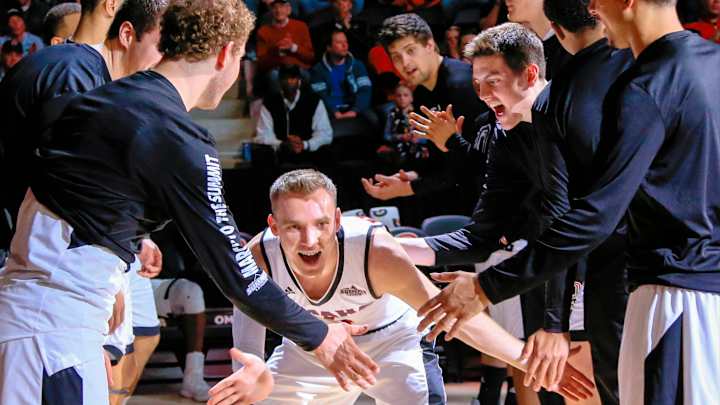PTSD in past, Neb-Omaha player advocates for mental wellness

OMAHA, Neb. (AP) Emotional leader. Never-quit player. Gritty. Kyler Erickson is all those things for the Nebraska-Omaha basketball team.
Most of all, he's a survivor.
Erickson was only a few feet away when a gunman burst into the office of his high school five years ago and started firing, fatally wounding an assistant principal and seriously injuring the principal. The sights and sounds Erickson was exposed to that horrific day led to his diagnosis of post-traumatic stress disorder over a year later.
Now healed, Erickson has made it his vocation to get the word out to young people to seek help if they are in mental distress. He recently was named to the prestigious Allstate Good Works Team, an award that honors athletes who have dedicated themselves to bettering the lives of others. His website, KylerErickson.com, details his journey and has attracted more than 75,000 views from 113 countries. He's volunteered for the National Alliance on Mental Illness and the last two years has spoken to groups at more than 50 schools, churches and mental health organizations in Nebraska and California, where his father lives.
''Mental health is single-handedly the most overlooked aspect of high school and college,'' he said. ''In one of my videos I say it's kind of like a poison. You back away from it. People don't want to touch it or talk about it.
''By telling my story, what I'm saying is that we need to talk about, we need to get you help. My story is, `Hey, I got help, and now I'm playing D-I basketball in Omaha and we're playing really well.' It's a story of how successful you can be afterward.''
Erickson, the Mavericks' sixth man most of the season, entered the starting lineup a couple weeks ago for one of the nation's highest-scoring teams. Omaha (18-12) is the No. 3 seed in the Summit League tournament that starts Saturday and will be trying to make the NCAA Tournament in its first season of eligibility.
Erickson's life changed Jan. 5, 2011. The night before he had hurt his ankle in a game for Millard South High School in Omaha. He was icing the ankle in the nurse's office - located within the administrative office area - when a senior who had been suspended that morning burst in and began shooting.
Erickson, another student and two administrators rushed into a bathroom in the nurse's office and huddled together until the gunman left the building. The shooter later was found dead from a self-inflicted gunshot. When Erickson stepped out of the bathroom, he saw blood-covered staff members who had gone to the aid of the two victims.
''For me, the screams were the worst part,'' Erickson said. ''It was like a horror film but real life. I couldn't get those screams out of my head.''
Rhonda Erickson said her son was distant, clearly not his usual happy self, in the months that followed. It wasn't until after he had left for Northwest Missouri State in the fall of 2011 that he and his family came to realize how seriously the shooting traumatized him.
Kyler redshirted his first year at Northwest Missouri, but he was barely functional in his new environment. He would wake up in the middle of the night seeing ghostly figures standing over him. He would go on crying jags if he heard loud noises in his dormitory. He struggled to concentrate. His anguish remained locked up inside until he poured out his heart to an athletic trainer in February 2012.
When he returned to Omaha in May, he began three months of a therapy called eye movement desensitization and reprocessing. Erickson would go into a room with his therapist for one hour twice a week, and a light board would flash in different patterns in front of him as he re-lived the harrowing experiences of Jan. 5, 2011.
Erickson explained that the treatment caused the memories to gradually shift from the right side of his brain, which is attached to one's emotions, to the left side. Eventually, Erickson could look back at the shooting from a position of strength, as an event he overcame.
Erickson didn't get much playing time in 2012-13 at Northwest Missouri, and he transferred to Omaha with no promise there would be a spot for him on the team. But a player got hurt, and coach Derrin Hansen asked Erickson to join the scout team for 2013-14. Last season, Erickson appeared in 22 games, and this season he's averaging 3.6 points in 19 minutes a game - 6.0 points in 30 minutes since starting the last five.
''There's an absolute huge difference in him, and I credit this Omaha basketball team to how well he's doing right now,'' said his older sister, Kayla. ''Kyler was meant to represent his city and his team in such a positive way, and he feeds off that.''
Kyler said he plans to continue advocating for mental health causes after he graduates in May with degrees in business management and entrepreneurship.
''He has overcome adversity, and the best thing about Kyler is he's able to go out and speak to youth about how they can overcome whatever issues they have,'' Hansen said. ''When I was 21 or 22, I wasn't nearly that mature. No way could I have done that. He has, and that just speaks volumes about who he is.''
